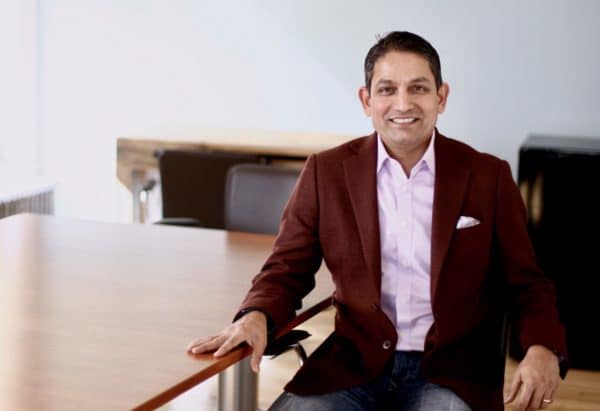
Launched in NYC in 2015, YieldStreet aims to allow people to invest in alternative investments that are backed by real collateral. With the ultimate mission of “prosperity for all,” YieldStreet has plans to help “millions” of investors attain financial independence. With a world-class advisory board which recently added three new members Ron Suber (Prosper Group), Mitch Jacobs (On Deck)Alexandra Wilkis Wilson (Gilt Group) and a growing leadership team, including Volfi Mizrahi who just joined as Managing Director of Originations and Ivor Wolk as General Counsel, the platform’s growth is undeniable. This November YieldStreet announced that the platform had surpassed $200 million in originations… just six months after the investment platform achieved its $100 million in origination milestone. Who is leading this successful venture? Milind Mehere. YieldStreet was co-founded by CEO Mehere, a serial entrepreneur and thought leader who also co-founded Yodle, which in 2016 sold to Web.com for $342M.
I recently caught up with Mehere via email to learn more about lessons learned before founding YieldStreet, future growth, the importance of mentors, regulations and investment advice. Please find our interview below.
Erin: Please share why you founded YieldStreet. How have you made your vision for YieldStreet come to fruition? What setbacks have you experienced and overcome?
 Milind Mehere: As I became successful in my career, I was fortunate to have more capital to invest, but I was overexposed to the stock market. I wanted to invest in asset classes like real estate or commercial businesses with strong cash flow, but my check wasn’t big enough. I knew there had to be a better way, and there was…
Milind Mehere: As I became successful in my career, I was fortunate to have more capital to invest, but I was overexposed to the stock market. I wanted to invest in asset classes like real estate or commercial businesses with strong cash flow, but my check wasn’t big enough. I knew there had to be a better way, and there was…
Soon, I was introduced to my co-founders Michael Weisz and Dennis Shields. As veterans of the specialty finance industry, they saw several inefficiencies in the fragmented hedge fund and PE space. Together we founded YieldStreet to provide accredited investors access to asset based investments that were previously unavailable. By allowing investors to participate at minimums as low as $5K and earn target yields of 8-20%, we are changing the way wealth is created.
To give you more detail on YieldStreet, we launched in 2015, and recently crossed $200M raised from retail investors only (since hitting $100M in April). So why have we seen this growth? We have highly structured investments, all backed by collateral, debt based/senior secured, low stock market correlation, and target yields of 8-20%. As mentioned, these are all attributes that an individual investor couldn’t previously consider or have access to. Further, we believe ours is the only investment platform that offers accredited investors multiple asset classes, including: litigation finance, real estate, commercial, consumer. Investors can create a fixed income portfolio and passive income stream.
[clickToTweet tweet=” Interview with @YieldStreet @MilindMehere #investments #fintech @fintechinsider_ @crowdfundinside” quote=”‘I wanted to invest in asset classes like real estate or commercial businesses with strong cash flow, but my check wasn’t big enough. I knew there had to be a better way, and there was…'”]
Erin: On what other elements of your YieldStreet street vision are you currently working?
Milind: Continuing to expand our product and audience offering – AutoInvest will let users choose their investment preferences such as asset class, yield and duration, then the algorithm our platform uses will match them as offerings become available. In 2018 we hope to open the platform to non-accredited investors, and we are working to provide liquidity on our platform, as well as creating products for the Financial Advisor/RIA market and IRA market.
Erin: How do you expect YieldStreet to grow? How do you source deals? Which have been the most profitable to date?
 Milind: So far, the deal flow has come from our founding team, which is deeply connected in the lending and specialty finance industry, as well as through referrals and our website. We work with a network of originators and asset managers, as well as many funds (from $50M to $10B) in the private credit space. We have created our proprietary data and credit underwriting using predictive modelling and are beginning to use machine learning in certain asset classes to construct portfolios and understand risk. We are using many channels to support the demand on the platform and scale our supply.
Milind: So far, the deal flow has come from our founding team, which is deeply connected in the lending and specialty finance industry, as well as through referrals and our website. We work with a network of originators and asset managers, as well as many funds (from $50M to $10B) in the private credit space. We have created our proprietary data and credit underwriting using predictive modelling and are beginning to use machine learning in certain asset classes to construct portfolios and understand risk. We are using many channels to support the demand on the platform and scale our supply.
Erin: Please tell me more about YieldStreet’s solution and diversified fixed income portfolio and investments. How have you made YieldStreet a more transparent and accessible investment landscape?
Milind: We have made these types of investments accessible, as someone can invest $5K, $10K, $25K, etc. in a $10M offering alongside other investors that are investing six or seven figure sums at the exact same terms. We can be agnostic to investment size, which wasn’t possible. Now, small investors get access to and can invest alongside large investors on the same terms.
Transparency is fundamental to our approach. We provide detailed information on each investment, focused on clear information to help investors evaluate the investments, as well as understand risks and fees. After an offering is closed, an investor gets detailed information about portfolio performance on an ongoing basis.
[clickToTweet tweet=”Q&A @YieldStreet @MilindMehere #investments #fintech @fintechinsider_ @crowdfundinside” quote=”‘Transparency is fundamental to our approach. We provide detailed information on each investment, focused on clear information to help investors evaluate the investments, as well as understand risks and fees.'”]
Erin: What lessons from Yodle — from its beginnings to its $342M sale to web.com in 2016 — have you applied to YieldStreet?
 Milind: Wow, there are so many. We have been incredibly efficient at YieldStreet because of that. We have just raised $3.7M in seed capital to reach $200M in originations, where some of our peers have raised anywhere from 6x-25x to achieve the same results. Yodle taught me to be extremely disciplined about where to invest and when. So, we had a tech heavy focus early on, then focused on acquisition starting last year and are now turning our attention to origination. Hiring the right talent was critical to our success. Creating a team that is empowered is also critical for our success.
Milind: Wow, there are so many. We have been incredibly efficient at YieldStreet because of that. We have just raised $3.7M in seed capital to reach $200M in originations, where some of our peers have raised anywhere from 6x-25x to achieve the same results. Yodle taught me to be extremely disciplined about where to invest and when. So, we had a tech heavy focus early on, then focused on acquisition starting last year and are now turning our attention to origination. Hiring the right talent was critical to our success. Creating a team that is empowered is also critical for our success.
Erin: How did you source your YieldStreet team?
Milind: It changes as we have evolved, but we have hand-picked the team with a diligent focus on culture fit, smarts and passion. Our team has come from a number of avenues, such as referrals, direct reach outs and angel lists. It has been painful at times, but very rewarding. I also keep a list of people I want to bring onboard from my past life and hope to get them excited about our mission.
We also recently expanded our leadership team with the addition of two senior executives, Volfi Mizrahi as Managing Director of Originations, and Ivor Wolk as General Counsel.
Erin: What an advisory board! Rob Suber of Prosper Marketplace, Alexandra Wilkis Wilson of Gilt, Mitch Jacobs of OnDeck, Rahul Gupta of FISERV… how have these advisors helped shape YieldStreet?
 Milind: They have been incredible in their own ways. With some I speak weekly and others as needed, but they are all very helpful. Ron has been incredible in helping us navigate the marketplace lending ecosystem and fundraising. Mitch has been incredible in thinking about scaling challenges from venture funded start up to a large operation. Alexandra has been very helpful to think through branding, marketing, scarcity, and creating an amazing customer experience the way she did at Gilt. They are all users of the platform. We are thankful for their guidance and support as we aim to scale the company to $1B in originations and beyond.
Milind: They have been incredible in their own ways. With some I speak weekly and others as needed, but they are all very helpful. Ron has been incredible in helping us navigate the marketplace lending ecosystem and fundraising. Mitch has been incredible in thinking about scaling challenges from venture funded start up to a large operation. Alexandra has been very helpful to think through branding, marketing, scarcity, and creating an amazing customer experience the way she did at Gilt. They are all users of the platform. We are thankful for their guidance and support as we aim to scale the company to $1B in originations and beyond.
Erin: Who do you see as your mentor(s)? Why?
 Milind: I have been incredibly lucky and I have had many mentors throughout my career. Mentors are critical to help you understand where and how to focus your energy, how to be a contributing member of the corporate world, and how to understand your strengths and weaknesses to think through critical decisions as it relates to your personality and your company.
Milind: I have been incredibly lucky and I have had many mentors throughout my career. Mentors are critical to help you understand where and how to focus your energy, how to be a contributing member of the corporate world, and how to understand your strengths and weaknesses to think through critical decisions as it relates to your personality and your company.
It’s important for you to have mentors that are truly unbiased and totally honest about your success and failures. That’s when you will get the most out of them. Also, you need to be vulnerable and be willing to share your concerns and needs openly.
[clickToTweet tweet=”On Mentors: @YieldStreet @MilindMehere #investments #fintech @fintechinsider_ @crowdfundinside” quote=”‘It’s important for you to have mentors that are truly unbiased and totally honest about your success and failures.'”]
Erin: What are YieldStreet’s future plans for growth by 2018? by 2020? by 2025? How do you predict the sector will change and be disrupted?
Milind: According to a recent report by PricewaterhouseCoopers (PwC), the asset management industry is set for “transformational change” and booming growth in the next decade. Alternative asset classes, such as real estate and private debt are expected to grow to about $21.1 trillion by 2025.
YieldStreet strives to change the way wealth is created. We want every consumer to have access to alternative products just like Wall Street insiders do today, and chart their way towards financial independence. We are committed to bringing products that are easy to understand and use to make this happen.
Erin: How can regulations be improved?
 Milind: The JOBS Act has allowed us to offer asset-based investments to individual investors who have never previously had access, which is a major step in the right direction. Currently YieldStreet is open to accredited investors.
Milind: The JOBS Act has allowed us to offer asset-based investments to individual investors who have never previously had access, which is a major step in the right direction. Currently YieldStreet is open to accredited investors.
The suitability requirements for non-accredited investors needs to be simplified and automated to make it easier vs. going through the expensive and laborious regulatory process. In general, securities and registration laws have a long way to go so that such products are more readily available to the masses.
Erin: What advice do you have for millennials about investing? for Generation Xers? for retirees?
Milind: According to news reports and research, millennials are set to receive a massive transfer of wealth, about $58 trillion. One simple piece of advice is it’s never too early or late to invest. Most of the time we think about spending (the hottest restaurant, watch, bag, vacation, car), but we should think about saving. Save at least 20%, and make sure you earn interest on that 20%, then make sure your interest earns interest (compounding) and, ideally, you will be all set for life.

